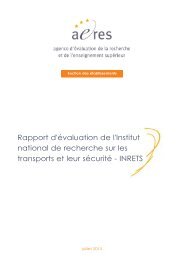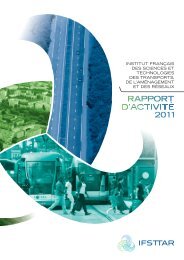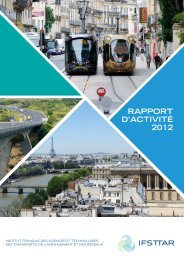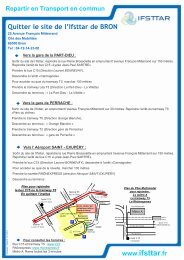french institute of science and technology for transport ... - Ifsttar
french institute of science and technology for transport ... - Ifsttar
french institute of science and technology for transport ... - Ifsttar
Create successful ePaper yourself
Turn your PDF publications into a flip-book with our unique Google optimized e-Paper software.
Partnerships <strong>and</strong> Joint ventures<br />
ENERGY AND TRANSPORT<br />
IFSTTAR continues to play an active<br />
role in ANCRE<br />
Since 2010, IFSTTAR has been running the working group on<br />
“Energy <strong>and</strong> Transport” (GP6), which is part <strong>of</strong> the National Alliance<br />
<strong>for</strong> Coordinating Energy Research (ANCRE), a body that was<br />
set up at government request in July 2009.<br />
Beyond its founding members (CEA, CNRS <strong>and</strong> IFP), ANCRE has<br />
extended partnerships with the French public sector research bodies<br />
that deal with energy-related issues, including IFSTTAR, in order<br />
to identify <strong>and</strong> ultimately overcome the main stumbling blocks,<br />
be they scientific, technological, economic or societal. This task<br />
involves, among other things, analyzing the strengths <strong>of</strong> French<br />
research entities by creating a detailed overview <strong>and</strong> proposing<br />
research programmes (from fundamental research to producing<br />
actual demonstrators) to overcome the difficulties.<br />
In all, over 500 experts were invited to participate in the nine thematic<br />
groups, five <strong>of</strong> which were devoted to energy sources (energy<br />
from biomass (GP1), fossil fuels <strong>and</strong> geothermal sources (GP2),<br />
nuclear power (GP3), solar power (GP4), marine, hydroelectric<br />
<strong>and</strong> wind power (GP5).<br />
Three other groups focused on end use (<strong>transport</strong> (GP6) supervised<br />
by IFSTTAR, buildings (GP7) led by the CSTB, <strong>and</strong> industry<br />
<strong>and</strong> agriculture (GP8) led by CNRS). The last group, (GP9), is more<br />
interdisciplinary <strong>and</strong> is involved in <strong>for</strong>ecasting <strong>and</strong> summarizing<br />
the findings.<br />
Group GP6, led by IFSTTAR, employs a two-pronged approach,<br />
i.e. by sector <strong>and</strong> by discipline.<br />
Nearly 80 IFSTTAR scientists provide their expert knowledge on<br />
vehicles, motor <strong>and</strong> engine <strong>technology</strong> <strong>and</strong> energy <strong>and</strong> its use<br />
across all <strong>transport</strong> sectors: road, maritime <strong>and</strong> river, rail, <strong>and</strong> air.<br />
By the end <strong>of</strong> 2010, GP6 had released an initial summary report<br />
with a series <strong>of</strong> recommendations on difficulties or technologies<br />
that merit further study, with projects <strong>for</strong> demonstrators. It also<br />
produced a preliminary skills map.<br />
Work continued in 2011, <strong>and</strong> a number <strong>of</strong> the group’s scientists<br />
have helped draw up the numerous proposals that have been<br />
put be<strong>for</strong>e the bodies responsible <strong>for</strong> funding research <strong>and</strong> future<br />
investment. This primarily involved internal combustion engines,<br />
electric <strong>and</strong> hybrid motors <strong>and</strong> <strong>transport</strong>-related aspects <strong>for</strong> both<br />
persons <strong>and</strong>/or freight, essentially in the road <strong>and</strong> rail sectors.<br />
With the exception <strong>of</strong> air <strong>transport</strong>, a very large proportion <strong>of</strong> GP6’s<br />
work has been based on output by PREDIT working groups <strong>and</strong>, as<br />
such, provides a valuable complement to the research in question.<br />
@ CONTACT<br />
jean.delsey@ifsttar.fr<br />
19<br />
SUSTAINABLE URBAN PLANNING<br />
A dominant role<br />
in the activities <strong>of</strong><br />
IRSTV<br />
The Urban Scientific <strong>and</strong> Technical Research Institute IRSTV)<br />
brings together some twenty laboratories from 13 research <strong>and</strong><br />
higher education establishments in western France. The research<br />
teams are working together to investigate cities <strong>and</strong> the urban<br />
environment with the goal <strong>of</strong> developing methods <strong>and</strong> tools <strong>for</strong><br />
sustainable urban planning. IFSTTAR plays a major role, taking<br />
part in many research projects that involve a large number <strong>of</strong><br />
bodies, in some cases as leader, in particular the Nantes Area<br />
Urban Environment Observatory (OVENU). This observation unit<br />
conducts long-term monitoring <strong>of</strong> water, pollutant <strong>and</strong> energy flows<br />
in a variety <strong>of</strong> media (air, water, soil …). It also conducts urban<br />
remote sensing in order to monitor several catchments in the<br />
Nantes conurbation.<br />
In the area <strong>of</strong> urban microclimatology, the GER unit studies suburban<br />
catchments, models moisture transfers between different<br />
parts <strong>of</strong> the urban environment (atmosphere, soil, hydrological<br />
networks, vegetation <strong>and</strong> the built environment) <strong>and</strong> analyzes the<br />
operation <strong>of</strong> techniques that provide an alternative to stormwater<br />
collection.<br />
In the case <strong>of</strong> urban soils (SOLURB), GER’s research focuses on<br />
how the nature <strong>of</strong> urban soils affects water <strong>and</strong> pollutant transfer.<br />
In the case <strong>of</strong> urban background noise, IM is working on the<br />
development <strong>of</strong> sound propagation models that take account <strong>of</strong><br />
urban <strong>for</strong>ms <strong>and</strong> the interactions between sound <strong>and</strong> the urban<br />
environment.<br />
In 2011, an ADEME project (SITERRE), in which GER is taking<br />
part, was launched. This deals with the creation <strong>of</strong> urban soils<br />
with innovative materials instead <strong>of</strong> topsoil <strong>and</strong> quarry aggregate.<br />
The year also saw the completion <strong>of</strong> the ANR-sponsored AVUPUR<br />
project on the hydrological modelling <strong>of</strong> suburban catchments.<br />
GER also helped organize the CNRS urban environment course<br />
that was held in La Rochelle from 19-23 September 2011<br />
@ CONTACT<br />
herve.<strong>and</strong>rieu@ifsttar.fr<br />
ANNUAL REPORT 2011 ifsttar.fr






![Trajectoire le magazine n°3 - Juillet 2012 [.pdf] - Ifsttar](https://img.yumpu.com/30038493/1/190x253/trajectoire-le-magazine-na3-juillet-2012-pdf-ifsttar.jpg?quality=85)

